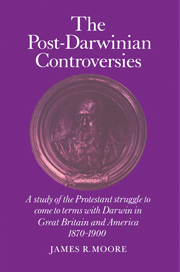 The Post-Darwinian Controversies
The Post-Darwinian Controversies Book contents
- Frontmatter
- Contents
- Dedication
- Preface
- PREFACE TO THE PAPERBACK IMPRESSION
- Introduction: the terrain of revision
- PART I HISTORIANS AND HISTORIOGRAPHY
- PART II DARWINISM AND EVOLUTIONARY THOUGHT
- 5 Darwinism in transition
- 6 The challenge of Lamarckian evolution
- 7 The vogue of Herbert Spencer
- 8 Darwinism and Neo-Darwinism
- PART III THEOLOGY AND EVOLUTION
- Conclusion: on coming to terms with Darwin
- Dedication
- Notes to the text
- Bibliography
- Index
7 - The vogue of Herbert Spencer
Published online by Cambridge University Press: 22 January 2010
- Frontmatter
- Contents
- Dedication
- Preface
- PREFACE TO THE PAPERBACK IMPRESSION
- Introduction: the terrain of revision
- PART I HISTORIANS AND HISTORIOGRAPHY
- PART II DARWINISM AND EVOLUTIONARY THOUGHT
- 5 Darwinism in transition
- 6 The challenge of Lamarckian evolution
- 7 The vogue of Herbert Spencer
- 8 Darwinism and Neo-Darwinism
- PART III THEOLOGY AND EVOLUTION
- Conclusion: on coming to terms with Darwin
- Dedication
- Notes to the text
- Bibliography
- Index
Summary
The biological theorist took for his central problem the question of the mutability of organic species and the conditions of their origin. The philosopher of science, on the other hand, proposed to cover a broader field, seeking to trace out not simply the course of biological development, but the evolution of the entire phenomenal universe from star-dust up to mind and social life. The aim of the one is a theory of species, of the other a doctrine of cosmical progress. … The theory of Darwin accounts for the genesis of natural kinds through adaptation to environment in virtue of natural selection under the conditions of the struggle for existence.
Spencer's ‘synthetic system’ explains the world and life on the basis of ‘the continuous redistribution of matter and motion’. Darwinism acquires a bearing on fundamental problems because of its relations, for in itself it is no more than the first principle of a special department of science. The Spencerian philosophy … is so inclusive in its scope that the synthesis undertaken involves from time to time the transcending of the limits of phenomenal inquiry.
A. C. ArmstrongBritain's leading Lamarckian was Herbert Spencer (1820–1903). His System of Synthetic Philosophy (1860–96) set forth a physical law which determined the evolution of ‘definite, coherent heterogeneity’ throughout the universe; his life-work proceeded from beginning to end on the assumption that biological adaptation occurs primarily through the inherited effects of environment and habit.
- Type
- Chapter
- Information
- The Post-Darwinian ControversiesA Study of the Protestant Struggle to Come to Terms with Darwin in Great Britain and America, 1870-1900, pp. 153 - 173Publisher: Cambridge University PressPrint publication year: 1979
- 2
- Cited by


